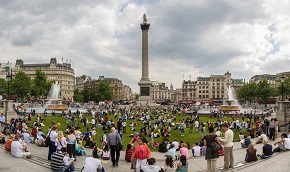Space
In very general terms, ‘space’ is an abstract term which tends to refer to a location which has not had a specific human value or purpose attached to it. This is as opposed to a ‘place’ which has an identifiable character, or a ‘location’ which has geometrical certainty.
Designers sometimes refer to 'negative space' as the space between and around objects such as buildings.
A public space is an area that tends to be open and accessible to all people. This includes roads, pavements, town squares, parks, beaches, and to a more limited extent public buildings such as town halls and libraries. The term 'common land' is sometimes used to refer to land in public ownership or to which everyone has access. To have such status, land must be legally registered as a common.
Privately-owned 'public' spaces are also a common feature of urban developments.These are spaces that are open to the public but owned and maintained by a private company. In some cases, this has been criticised for removing space from the public realm, with owners sometimes applying more rules and restrictions than there would otherwise be. Those in favour however argue that, in many cases, it can involve the improvement and regeneration of spaces that were previously neglected or poorly-used.
Space can also refer to a specific area or volume within a building, such as; useable and un-useable space, storage space, teaching space, and so on.
There are a number of guidelines, standards and regulations for the sizes of specific spaces. For example, in 2015, the government published the Technical housing standards - nationally described space standard which replaced existing space standards used by local authorities. This standard deals with internal space within new dwellings and sets out requirements for the gross internal floor area of new dwellings at a defined level of occupancy as well as floor areas and dimensions for key parts of homes.
For more information see: Technical housing standards - nationally described space standard.
Other articles relating to space on Designing Buildings Wiki include:
- Accessibility in the built environment.
- Bedroom standard.
- Bedspace.
- Building spaces.
- Conservation areas and protecting open space.
- Local green space.
- Minimum bedroom size proposals.
- Minimum space standards.
- NHBC technical standards.
- Placemaking.
- Public space intervention.
- Office space planning.
- Open space definition.
- Space classifications for lighting controls.
- Space planning.
- Terraced houses and the public realm.
[edit] Related articles on Designing Buildings Wiki
Featured articles and news
ECA progress on Welsh Recharging Electrical Skills Charter
Working hard to make progress on the ‘asks’ of the Recharging Electrical Skills Charter at the Senedd in Wales.
A brief history from 1890s to 2020s.
CIOB and CORBON combine forces
To elevate professional standards in Nigeria’s construction industry.
Amendment to the GB Energy Bill welcomed by ECA
Move prevents nationally-owned energy company from investing in solar panels produced by modern slavery.
Gregor Harvie argues that AI is state-sanctioned theft of IP.
Heat pumps, vehicle chargers and heating appliances must be sold with smart functionality.
Experimental AI housing target help for councils
Experimental AI could help councils meet housing targets by digitising records.
New-style degrees set for reformed ARB accreditation
Following the ARB Tomorrow's Architects competency outcomes for Architects.
BSRIA Occupant Wellbeing survey BOW
Occupant satisfaction and wellbeing tool inc. physical environment, indoor facilities, functionality and accessibility.
Preserving, waterproofing and decorating buildings.
Many resources for visitors aswell as new features for members.
Using technology to empower communities
The Community data platform; capturing the DNA of a place and fostering participation, for better design.
Heat pump and wind turbine sound calculations for PDRs
MCS publish updated sound calculation standards for permitted development installations.
Homes England creates largest housing-led site in the North
Successful, 34 hectare land acquisition with the residential allocation now completed.
Scottish apprenticeship training proposals
General support although better accountability and transparency is sought.
The history of building regulations
A story of belated action in response to crisis.
Moisture, fire safety and emerging trends in living walls
How wet is your wall?
Current policy explained and newly published consultation by the UK and Welsh Governments.
British architecture 1919–39. Book review.
Conservation of listed prefabs in Moseley.
Energy industry calls for urgent reform.




























